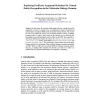Free Online Productivity Tools
i2Speak
i2Symbol
i2OCR
iTex2Img
iWeb2Print
iWeb2Shot
i2Type
iPdf2Split
iPdf2Merge
i2Bopomofo
i2Arabic
i2Style
i2Image
i2PDF
iLatex2Rtf
Sci2ools
DIS
2005
Springer
2005
Springer
Exploring Predicate-Argument Relations for Named Entity Recognition in the Molecular Biology Domain
In this paper, the semantic relationships between a predicate and its arguments in terms of semantic roles are employed to improve lexical-based named entity recognition (NER) in the molecular biology domain. The semantic roles were realized in various sets of syntactic features used by a machine learning model to explore what should be the efficient way in allowing this knowledge to provide the highest positive effect on the NER. The empirical results show that the best feature set consists of predicate’s surface form, predicate’s lemma, voice, and the united feature of subject-object head’s lemma and transitive-intransitive sense. The performance improvement from using these features indicates the advantage of the predicate-argument semantic knowledge on NER. There are still rooms to enhance NER by using this semantic knowledge (e.g. to employ other semantic roles besides agent and theme and to extend the rules for efficient identification of an argument’s boundary).
| Added | 27 Jun 2010 |
| Updated | 27 Jun 2010 |
| Type | Conference |
| Year | 2005 |
| Where | DIS |
| Authors | Tuangthong Wattarujeekrit, Nigel Collier |
Comments (0)

